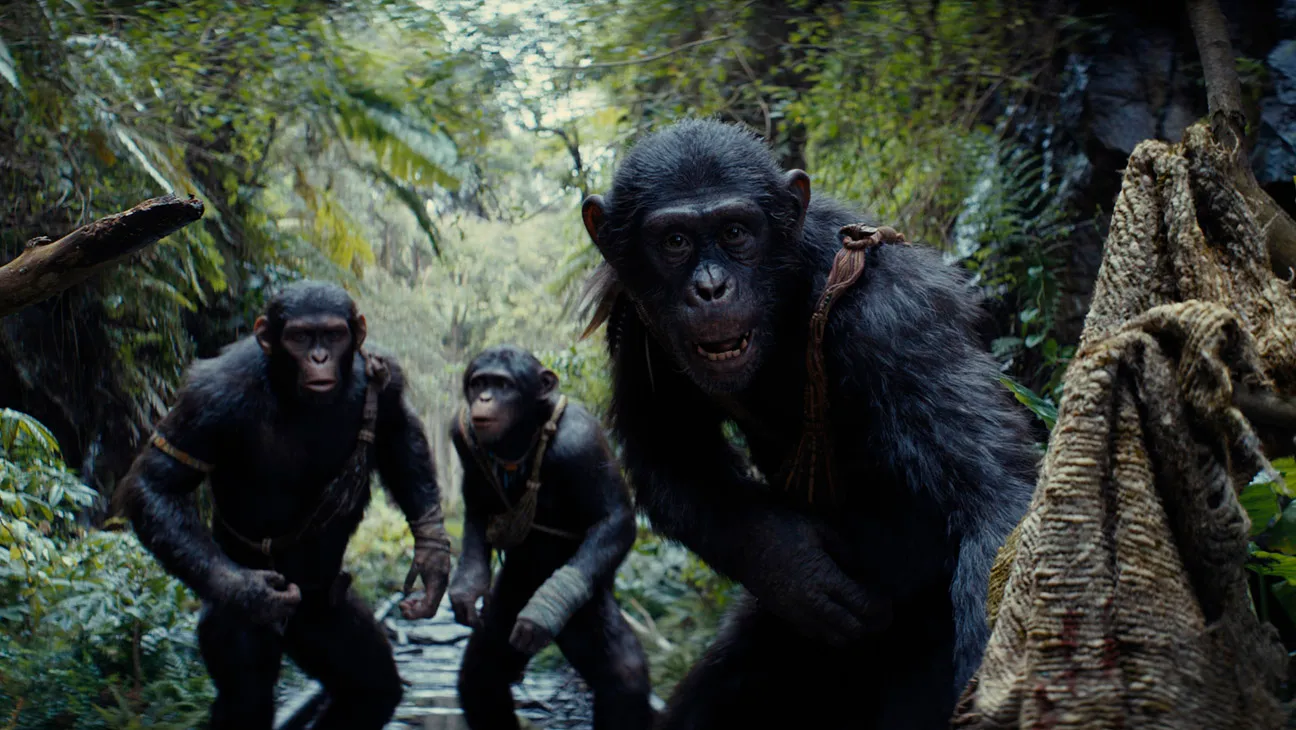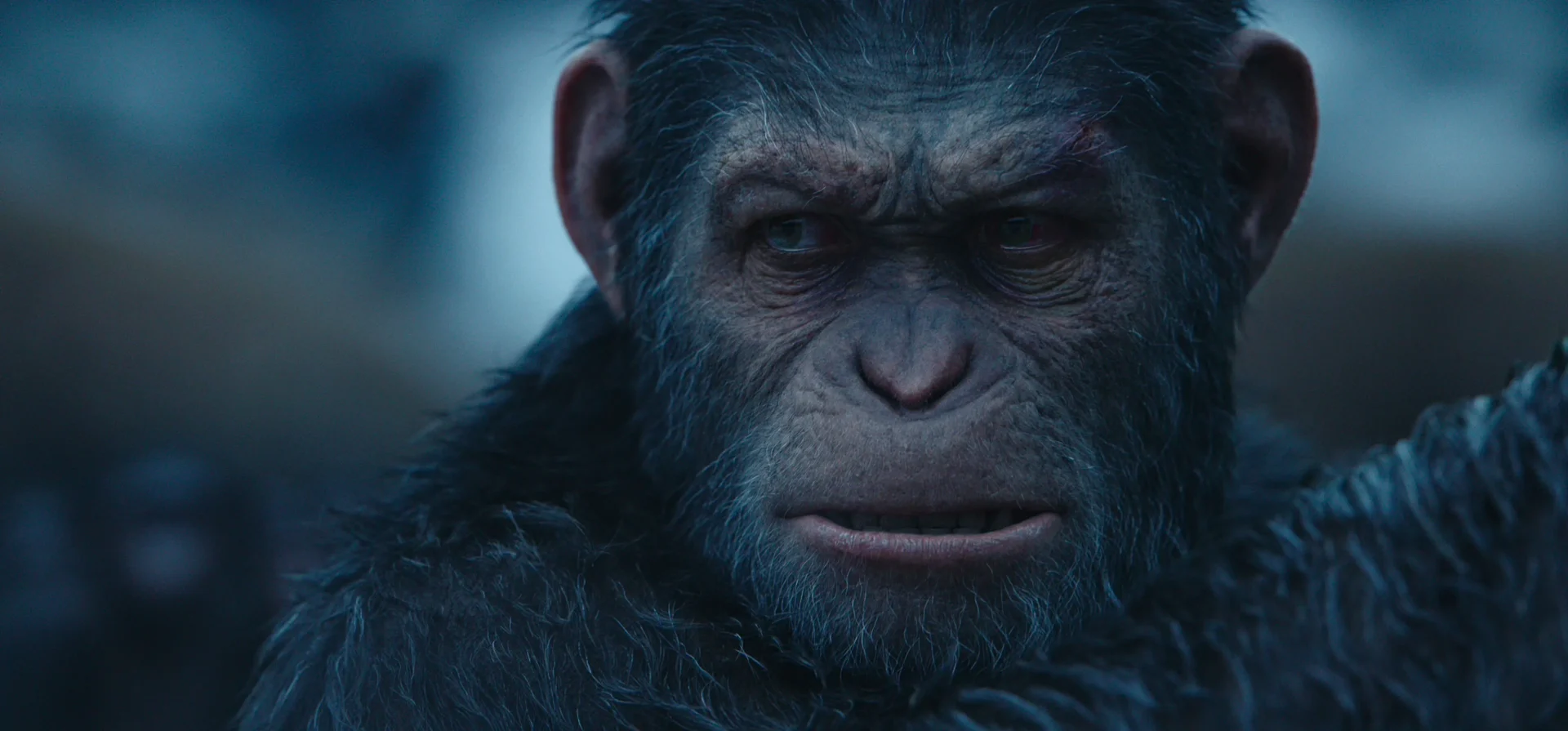“Kingdom of the Planet of the Apes” is set generations after the events of this series’s immediate predecessor, “War for the Planet of the Apes”—according to the time card onscreen, many generations later—but that doesn’t stop the director Wes Ball from introducing his own potential trilogy kickoff with the closeup on the dead body of previous trilogy lead, Caesar. A fitting metaphor for any franchise content to dig up the dead in the name of brand recognition, Ball’s film holds a distinct advantage in that the backbone of its mythos is entirely based around the reverberation of legends about where this universe began. “Kingdom,” then, takes full advantage of this notion, allowing Caesar’s influence to carry its weight throughout a film desperate to make sense of the vision he left behind.
Some 300 years after the Ape Messiah has perished, a small village of evolved chimpanzees exists contently in their small enclave, blissfully unaware of Caesar’s existence and partaking in their own generational rituals based around the bonds they cultivate with eagles. One such young chimp is Noa (Owen Teague), whose own quest for a proper rite of passage inadvertently puts his clan at the mercy of a vicious rival group that swoops in, captures the inhabitants, and leaves Noa for dead. It’s now up to the headstrong ape to track these bandits down and retrieve his family, as this goal leads him to uncover some secrets of a world before his time, as well as the humans who set the path to where he is now.
Introducing an entirely new set of characters and establishing the world in which they live is challenging enough, but “Kingdom” carries the extra burden of connecting those new ideas towards the foundation that Rupert Wyatt and Matt Reeves laid out in the previous decade. It’s a task that requires a great deal of balance—and, per this film, just as much runtime—but Ball and writer Josh Friedman prove themselves up to the task, utilizing Noa’s confident presence as a lead-in to the world he knows, while his curiosity guides us towards the discoveries that bring us back to those roots.

Part of what made the previous trilogy so moving was the inherent tragedy of the journey; from prior experience (i.e., the pre-reboot saga), we already know that the “Planet of the Apes” will someday become, well… a planet of apes. We know that Caesar’s journey will, at some point, end, and his vision for a peaceful coexistence between man and ape is something we know to be a moss-covered pipe dream. To see where Caesar’s journey takes him in this futile ambition, therefore, sows the plentiful seeds for the saga’s ruminations on the dynamic between humans and the animals they seek to conquer; if apes become the dominant species, relegating their human counterparts to subservient status, are they any better than the lowly creatures who once put them in cages?
These are (obvious) ideas that “Kingdom” opts to tackle head-on, as the foreignness of humanity’s dominance in this period of the series brings with it just as many exciting discoveries as complicated questions—for viewers, these are framed more as inevitable realizations. This friction comes manifest in the rival group of apes led by Proximus (Kevin Durand, trading in his usual douchey brand of villainy for something far more sinister in its enthusiasm), who twist the teachings of Caesar into self-serving ideas of grandeur and supremacy. Basically, if Caesar was Ape Jesus, then these guys are Ape Republicans.
Where Ball’s vision comes up short is in the detailed exploration of these ideas that would add anything to the series we haven’t already seen. Sure, from a narrative perspective, “Kingdom” builds upon the steps laid by “Rise,” “Dawn,” and “War,” but what these narrative advancements entail—divisive radicalization and compassion in the face of that inevitable discord—aren’t quite developed in any way more textured than the dynamics between Caesar and Koba, or Caesar and the Colonel.

You may then be thinking, who cares? It’s a Planet of the Apes film; how is the Planet, and how are the Apes? Ball’s world-building is sufficient in its sense of wonderment—a moment in which Noa looks through a telescope, but Ball refuses to show us his perspective just adds to the mysterious awe of a concept we humans already understand—and the visuals, marred by flat lighting as they may be, are just as absorbing in their detail as ever. It’s almost enough to forgive the eventual discovery that the entire final act of this film, when you think about it, is pretty much a carbon copy of vast swaths of the climactic act from the one that came before it.
Perhaps this issue would be less noticeable if the beings inhabiting this story retread were more layered, but aside from Teague’s solid lead work and Durand, who squeezes every ounce of menace from his villain’s haphazard inclusion in the film’s back half, few of these characters are afforded a believable weight to anchor Noa’s journey. The human May (Freya Allan) is particularly sketchy in this respect, as the depth of her competency feels irregularly thought-out by Friedman’s script, dropping any consistency in character growth that would make her complexity more intriguing, and settling for a half-written mouthpiece for the film’s conception of interspecies conflict.
In a world once dominated by concrete and cruelty, “Kingdom of the Planet of the Apes” sees in its vast overgrowth and abandonment the bonds between those who remember the past as a weapon of manipulation and those discovering it as a path towards something more righteous. It’s a solid foundation that Wes Ball explores with great fervor, but also one that could use a greater sense of drive and purpose to warrant distinction from what felt like such a cohesive arc suddenly reanimated, with little growth to be found in its ashes. When it’s all said and done, and Wes Ball probably gets his new Apes trilogy, “Kingdom” will likely be viewed in the grand scheme of this larger tale as a bridge linking together more ambitious ideas.



![The Eagle Huntress [2016] – A Feel-Good Documentary Led by an Incredibly Charismatic Girl](https://79468c92.delivery.rocketcdn.me/wp-content/uploads/2017/05/cover-768x432.jpg)


![Garuda Gamana Vrishabha Vahana [2021] Zee5 Review: An Intelligent Gangster Film with a Stimulating Sense of Milieu](https://79468c92.delivery.rocketcdn.me/wp-content/uploads/2022/01/Garuda-Gamana-Vrishabha-Vahana-768x512.jpg)

![Sorry We Missed You [2019] ‘MAMI’ Review – Repercussions of shifting Gig-economy](https://79468c92.delivery.rocketcdn.me/wp-content/uploads/2019/11/Sorry-We-Missed-You-Review-768x432.jpg)